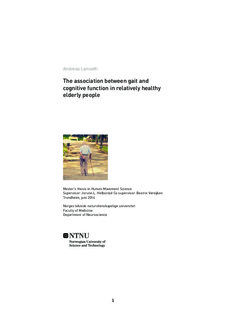The association between gait and cognitive function in relatively healthy elderly people
Abstract
Background: Age related changes in physical and cognitive function are well documented. A wide range of gait characteristics has shown associations with cognitive function in elderly people, but it is unclear which gait parameters are best suited when investigating the association. Furthermore the gait conditions in which the gait parameters are recorded may influence the association.
Aim: The aim of the study was to investigate the association between gait characteristics and cognitive function in a relatively healthy elderly population, and to determine which gait parameters show the closest association with cognition. Secondary aims were to investigate the association between gait and cognition in different walking conditions, and to evaluate possible gender differences in the association.
Design: This study used a population based cross sectional design.
Methods: Data was collected from 405 participants. Of these were 11 subjects excluded,
resulting in a sample size of 394. Gait characteristics were measured using a 6.10 meter
computerized walkway and cognitive function was measured using the Montreal Cognitive
Assessment (MoCA). Pearson’s correlation test (Pearson’s r) and multiple linear regression models were used to investigate the associations between gait characteristics and cognition.
Results: Low to moderate significant bivariate correlations between several gait parameters and cognition, including both spatial and temporal measures was found. Gait speed was significantly correlated to cognitive function in all walking conditions, for both men and women. When adjusting for covariates gait speed remained significant in all conditions, except from fast gait speed condition in men. Of the variability measures only Stance Time SD in men in the preferred walking condition was significantly correlated with cognition. The most and strongest correlations were found when testing in the preferred walking speed condition. The associations were stronger in women.
Conclusion: Of the included gait parameters, gait speed showed the nearest correlation to
cognition. Future studies on the relationship between gait and cognition may include several gait conditions in their protocol, and include gait parameters that cover the range of gait domains. Furthermore, future studies may determine early gait markers that works as predictors of future cognitive decline, in order to initiate appropriate interventions.
